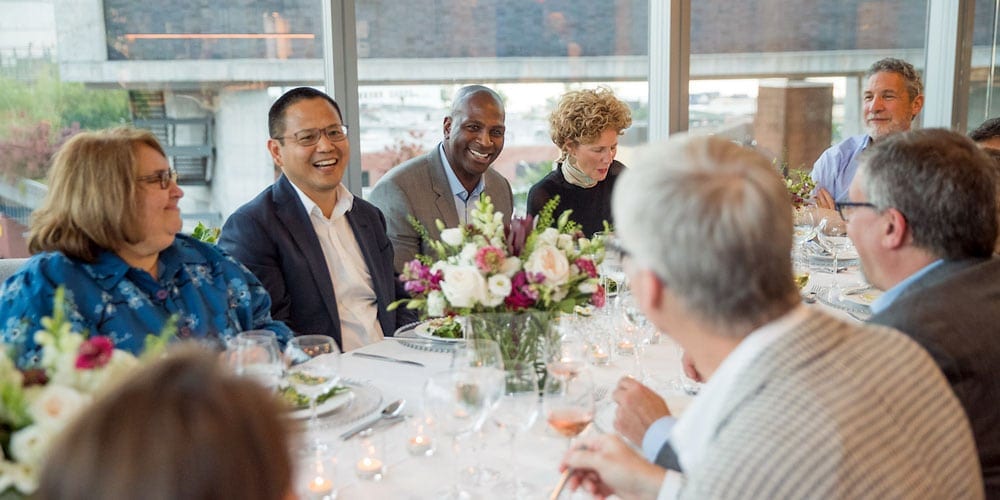Experts Unite to Discuss Mindfulness and Healthy Workplace Culture
By Emily WinerThe Garrison Institute and IWBI (International WELL Building Institute) have a shared goal of fostering healthy, mindful, and resilient individuals, organizations, and communities.
Earlier this summer, the Garrison Institute and IWBI brought together a group of experts for a special type of dinner party–a Jeffersonian dinner centered around the WELL Mind concept (Mind), one of the ten concepts of the WELL Building Standard, a performance- based system for measuring, certifying, and monitoring how buildings impact human health and wellbeing. Mind outlines a framework for organizations to support cognitive and emotional health through workplace policies, programs, and design.
The rules of a Jeffersonian dinner are simple: bring together a small group of leading experts with diverse backgrounds and perspectives to discuss a specific topic. What sets it apart from your average dinner party is that throughout the entire evening, only one person is speaking at any given time, meaning that the collective wisdom found in the room is singularly focused in on one conversation.
Facilitated by Jonathan Rose, President of Jonathan Rose Companies, and IWBI’s President, Rachel Gutter, both Co-Chairs of the Garrison Institute Board of Trustees, the conversation focused on mindfulness, community-building, and qualities of the workplace that support individuals in getting to a state of creativity, collaboration, productivity, and engagement.
The group discussed how healthy environments are created by the combination of space and culture, both of which must complement one another and work harmoniously. Facing forward, from left: Lauren Zullo, Director of Sustainability at Jonathan Rose Companies; Marc Weiss, Executive Director of the Garrison Institute; Randy Fiser, CEO of the American Society of Interior Designers; and Emily Winer, Mind Concept Lead at IWBI.
Sharon Salzberg (center), world-renowned teacher of mindfulness, discussed contemplative practices that enhance well-being, and how mindfulness can be used as a tool for communication, social cohesion, and community building.
The renowned group’s expertise expanded across a broad group of disciplines, including psychology, neurobiology, mindfulness, architecture and design and workplace culture.
Dan Siegel (left), clinical professor of psychiatry at the UCLA School of Medicine and the founding co-director of the Mindful Awareness Research Center at UCLA, described the scientific connection between mindfulness, well-being, and the brain. Sarah Williams Goldhagen (right), architect, lecturer, and author.
For the IWBI team, the opportunity to dialogue with this distinguished group of experts was invaluable. Lessons learned will inform how IWBI can most effectively use Mind as a vehicle for scaling mindful practices and design, as well as how WELL can support organizations in meaningfully integrating mindfulness and mental well-being into the fabric of workplace culture.
Explore the Mind concept in WELL v2. to learn about the transformative power of putting cognitive and emotional well-being at the center of buildings and communities.
Emily Winer supports the Standard Development team at the International WELL Building Institute, drawing on her knowledge of the built environment, research, and public health to lead the Mind concept of the WELL Building Standard.
